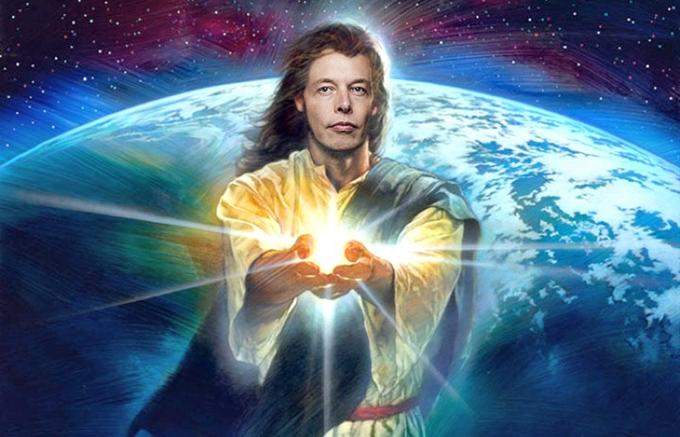
In our current “special report” are set forth two items of “great deception.” We won’t spoil it for those who have not read it yet.
But suffice it to say it has to do with the far outer bounds of technology, along with paranormality.
That’s not what we’re addressing here. What we seek to explore here is how the New Age is being replaced by, or morphing into, the Religion of Silicon Valley. Staring down at it, does it not seem as if we are bowing to our cell phones, which can seem almost all-knowing and supernatural?
It’s all around us. We nearly pray to it at night. Think about how much time the average person, even the average believing Christian, perhaps even the average devout Christian, spends in front of a cell phone, tablet, or laptop (never mind at the altar of TV) — versus how much time is spent in prayer.
Therein is a crisis.

Take it from writer Caroline Chen, who says in Market Watch, “Silicon Valley is famously non-religious, showing one of the lowest rates of religious affiliation in the United States. But in my study of work and spirituality in Silicon Valley, I found that tech workers do worship — at work.
“Companies offer meaning, mission, and purpose,” she writes.

This is hardly to denigrate what each person believes is a mission; it’s excellent to find purpose. God rewards good intentions. When does it go too far?
“Companies support that faith with all-hands meetings that feel like revival meetings, led by charismatic, inspiring and god-like leaders like Steve Jobs or Elon Musk,” says Chen.
“Whether it’s his plan to seed the world with electric cars, solar panels, and battery storage systems, or send settlers to Mars, the billionaire futurist’s steady stream of ideas has helped him garner a following that could easily be described as religious,” frets Salon Magazine over Musk. “He’s not the only adored CEO tooling around the Bay Area, but Musk has been particularly successful in fostering a cult-like following similar to the one bestowed upon the late co-founder of Apple, Steve Jobs.”
Technology can sometimes seem like magic, the article points out, “something beyond our mortal understanding.”
“If you look beneath the apparent benefits in these areas, the religion of work is highly exclusive and extractive – religion at its worst, not best,” argues Chen. “While their lives may still be filled with purpose, it’s one that their companies ultimately use to enhance the bottom line.”
“It seemed,” says another writer, Lena Wang, “with the advent of nuclear technology, humans supplanted the role of God—we had achieved the means to dictate the terms of our own deaths.”
At some high-tech retreats (or pep sessions), there are occasional readings from the Bible. But when it comes to “conventional” spiritual inspiration (when there is a break from worshipping the integrated chip), managers are prone to bring in Buddhist monks (by the dozen), or speakers such as Wayne Dwyer — surely a nice enough man, with some good things to say, but also, surely, a New Ager.
(Is it — Silicon Valley — the new Holy Land?)
Where is God in all of this? Where’s the soul? Says the Union of Orthodox Journalists: “Elon Musk: ‘Everything that you perceive, feel, hear, think – it’s all action potentials, it’s all just neural spikes.’ Consequently, for Elon Musk, our entire consciousness, our entire personality, are nothing more than a special bundle of electrical impulses.”
Continues Wang, “The perception has shifted, recently, from the belief that technology can make us gods, to technology emerging as a god in its own right. Silicon Valley comes with its own tenets. Soylent is the Eucharist and Steve Jobs is a martyr.”
Who is silicon’s pope? Musk, or perhaps Bezos?
It keeps changing (depending on monetary “worth”).
Some would argue Zuckerberg. (Is Gates then Pope Emeritus)?
They all have helped create a new global language fit for the ziggurat at Babylon.
Heaven redux. A Google search reminds one of accounts during death when those who return say upon entrance into the afterlife, their questions were answered instantly.
The altar is silicon. The plastic of cell screens is stained glass. The keyboard is prayer. The “god” is the pulse generated when the “enter” button is pressed through inconceivable networks — a seeming but deceptive infinity.
+

